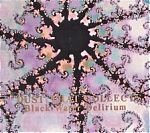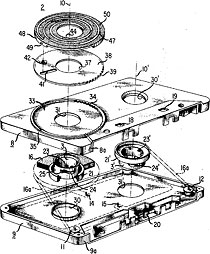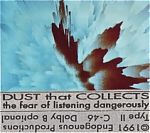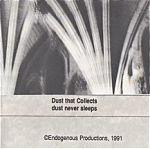Ron McFarlan

Perhaps my favorite of the Dust That Collects tapes was “Black Water Delirium”, above. Psychedelic twists and turns of vibrating madness
In 1985, a friend with whom I had just finished nursing school acquired the legendary Fostex X-15. We made a tape under the name Visceral Landscapes and sent it to some college radio stations and a few other home tapers. Probably the first trade we received was from one Dan Burke from the Chicago area. Maybe 5 years later, it was my privilege to open for Illusion of Safety at the Music Gallery here in Toronto under my solo project “Dust that Collects”. Another noteworthy collaboration was with Darren Copeland who went on to make a career out of acoustmatic sound design and radio art. For me, if there ever was a Golden Era for college/community radio and the DIY scene, it was in that time of the mid to late 80’s. Hosting a program devoted to cassette culture, also called Visceral Landscapes, gave me the opportunity to play many of the tapes acquired through trade with emphasis on that style we used to call post industrial. Other styles which were prevalent were ambient, power electronics, space rock and mutant jazz.
It was the networking with people from around the world which gave me the most satisfaction. If there was something which united so many of us, it was that we were in the minority in our respective communities, yet with a taste for something different. Being able to produce an alternative to the shit which mass culture handed to us every day just made it that much better. A modicum of recognition didn’t hurt either; I really felt like I had achieved something when I received a letter from Robert Oot which contained a glowing review of my first solo release “Black Water Delirium”. This was to be published in Sound Choice, but alas, my first big disappointment came when it turned out that fine publication was just ready to fold and the review wouldn’t see the light of day. The rival publication, Option, just kept getting more and more glossy as it careened into the ditch as well.
Someone told me a few years back, that the kind of sound art which many of us were involved with was a kind of folk music for our generation. True or not, I like the comparison because as weird as it got, the art form continued to grow out of an ever expanding cultural base of reference. As there was more to react to (and often reject), there were a myriad number of ways of expression and whether you were musically inclined or not, you could hit “record” and make something your own. Today, the “penpals” with whom you can share your creations are that much closer, thanks to the technology.
Since having children and a busy career in health care, I still love to bliss out to the noise I create but have less interest in getting my sounds “out there”. I’ve maintained some involvement with community radio and profiling experimental music but that activity is waning as well. But if I’ve noticed one thing, in much of the music I still love, be it so called post rock or glitch or freakfolk or freeform whatever, I actually hear the spirit of what many artists were trying to achieve from the home taping era (rather than making technically proficient straightforward rock or jazz or SOMETHING THAT SELLS). I may yet make some sort of return foray via the internet but for now it’s simply great seeing how many have continued their passion with home recording and DIY culture.
In looking at the origins of cassettera, I didn’t mention a couple other realizations along the way which kind of slowed me down and rethink my involvement.
- no one I networked with was being “converted” so to speak, the vast majority were already involved themselves. In the time since, I have found that at experimental shows, the person who is “just a fan” is truly the exception, most seemed to have their own little project. There is still a lot of preaching to the choir as it were.
- in the record shelves, there were albums by Popul Vuh and the Durutti Column which were repackaged as “Music for a New Age”. Sheesh.
- many of the early instigators on vinyl were veering towards “dance” music and appeared as blatantly going for the money.
- sometimes I saw some people pour their hearts and souls into their music or zine and lose something in the process.
- and finally, in the early 90’s, I worked for a couple years in the middle east hoping to make more of a splash when I came back. I remember distinctly finding classic cds by Eno and Bill Nelson for 3$ in delete bins. It just made me think, “how badly do I want to invest in this possibility?”. Of course, in hindsight, it may never have troubled Eno or Bill Nelson that their saturation point would occur so quickly but I was discouraged nonetheless.
And I don’t thing I was alone in making these observations (granted that these are more commercial considerations rather than creative). However, as I concluded, I still love noodling around with guitar and electronics and still enjoy spending my precious free time on that rather than the larger periods needed for promotion, gigging and distribution.



